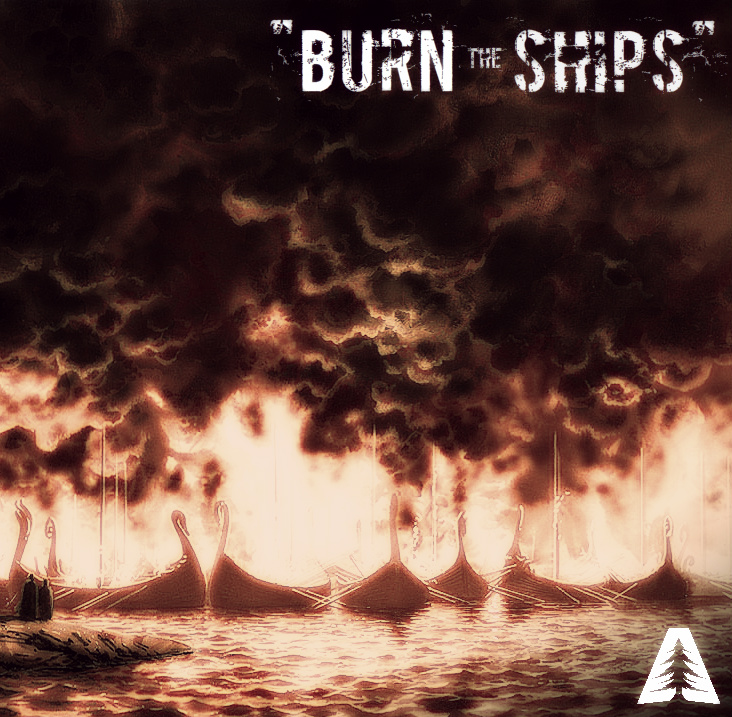Narragansett Bay, 1772
At times, a line needs to be drawn.
The small yet fruitful Rhode Island colony is one of the key centers of trade in the America’s. With direct access to the Long Island Sound and Atlantic Ocean, her largest settlement - Providence - has grown into one of the most lucrative ports for trade with both fellow colonies and nations abroad.
While merchant trade is booming throughout the 1760’s, Rhode Island - like many colonial settlements at this time - has begun to earn a treasonous reputation with their British rulers. Throughout the Seven-Years War, colonists from in-and-around Providence were known to have secretly aided the French, while withholding goods and funds from the British.
Once England has achieved their decisive, yet expensive, victory against the French in 1763, Parliament begins developing methods to raise funds to pay off their enormous wartime debts, and strengthen defenses throughout their colonial holdings. This was accomplished the best way they knew how: taxes. New taxes, duties and fees began to appear in the colonies throughout the 1760’s - many of which will go on to gain notoriety. For the merchants and sailors in Rhode Island, this meant new customs taxes on the import and export of goods. To enforce them, the British began utilizing their powerful navy - a wartime asset - to police civilian commerce.
The Sugar Act of April 1764 imposed the first post-war tax on maritime merchants, and was heavily enforced by the British Navy, who used it as an excuse to halt and board colonial ships, often times confiscating cargos or outright stealing goods under the barrels of their guns. Tensions begin to rise, and a breaking point comes in July.
The HMS St. John - one of Britian’s patrol ships - has been stealing goods from merchant vessels she stops under the authority of the Sugar Act. In response, a large crowd of citizens are able to storm and capture Fort George on Goat Island, which lies off the off the coast of Newport on the eastern side of the bay. They proceed to arm the cannons and open fire on the HMS St. John. While the St. John is able to quickly flee the harbor, the event foreshadows what is to come.
Naval containment around Narragansett Bay strengthens to the point where local fishers and merchants are rarely willing to venture out into the waters. The towns around the bay have thus become filled with droves of able sailors in desperate need of employment, and a local economy that has slowed to a crawl.
On July 4, 1765 - the King’s birthday - the HMS Maidstone, one of Britain’s larger vessels patrolling the waters off Newport, stops a merchant ship coming into port from abroad for what they describe as a routine inspection. Once aboard, the crew seizes their cargo and much of the crew. Later that evening, a longboat loaded with crewmen from the Maidstone comes ashore in Newport to celebrate the days catch. Upon landing, the boat is immediately overwhelmed by a crowd reportedly numbering over 500 citizens. They scatter the British crew and proceed to drag the boat out of the water and up the street to the center of town. On the lawn of the Newport commons, the people set it set ablaze.
The situation intensifies.
Additional taxes are levied in 1767 as part of the Townshend Acts. One of the first seizures under the new laws is a ship belonging to future Founding Father, John Hancock: the Liberty. British officials in Boston accuse Hancock of avoiding required taxes under the Acts and thus, without trial, his ship is confiscated and refitted to serve as a naval warship under the ironic name HMS Liberty. While charges against Hancock are eventually dropped, the ship remains with the British Navy.
The Liberty is then given her first assignment: she is to head south to Narragansett Bay, Rhode Island. The latest of his majesty’s vessels patrolling commerce in the bay, she becomes the next target of the citizenry around Narragansett Bay.
On July 17, 1769, the HMS Liberty halts and seizes two vessels from Connecticut bound for Providence, along with their captains, under “suspicion of having done an illicit act.” Two days later, the captain of the Liberty - William Reed - is captured by locals while ashore on leave, and subsequently forced to order his men to abandon the ship. Locals then row out to the vessel and cut the anchor lines, allowing her to drift aground. The ship is immediately consumed by the citizenry; her masts cut down and the ship burned. The Newport Mercury - a local paper - reported the fires lasted on the beaches of Newport for several days. The two captured vessels, their captains and cargos are subsequently released from captivity.
Not seeing the writing on the wall, the British increase choose to tighten the noose: rather than entertaining methods to ease colonist’s economic hardships, security is simply increased yet again in the waters around Rhode Island. More Redcoats, and more naval warships.
One of the new vessels dispatched to the Narragansett Bay is of French origin, having been turned over to the British following the end of the Seven Years War. The HMS Gaspee arrives in March of 1772, and does not waste time in bringing down the hammer on the rambunctious and rebellious Rhode Islanders. She and her commanding officer, Lieutenant William Dudingston, gain a reputation of ruthless enforcement, stopping every vessel entering or leaving the harbors of the bay. Those who attempt to avoid or flee the Gaspee are simply fired upon until they submit. Resembling a privateer rather than a lawful naval vessel, they capture cargos, crewmen and vessels, and levy heavy fines to all those merely suspected of illegal activity. Without investigation or trial, many local merchants lose everything at the whim of Lieutenant Dudingston.
The Gaspee - a two-mast schooner - is smaller than other traditional British warships. Yet, what she lacks in size, she makes up for with maneuverability and speed; assets which make her nearly impossible to avoid in the complex waterways of the Narragansett Bay. She also sports eight heavy guns, giving her more than enough firepower to overtake any merchant, fishing or packet vessel. As such, none dare to challenge her in either fight or flight; once approached, all simply submit to the Gaspee.
It is not long before complaints begin to flood into the office of Rhode Island Royal Governor, Joseph Wanton. Not only was the Gaspee hindering trade, confiscating property and detaining colonial citizens, her crew was reportedly coming ashore to forcibly gather supplies from local farmers. In exploring the matter, the Governor finds that in the first 2 months, the Gaspee has stopped and ransacked over 200 civilian vessels, yet found only 2 in violation of the King’s laws. While he has attempted to quell the previous conflicts between the British Navy and his people, Wanton is unable to continue ignoring the situation. He authors a series of letters to Lieutenant Dudingston, demanding he come ashore to present his commission and answer for his actions.
Bluntly, Dudingston refuses. In a letter he writes in response, the British Lieutenant informs Governor Wanton he is under order of the King and thus, answers only to him and his chain of command; he owes Governor Wanton and the people of Rhode Island nothing. Wanton’s appeals to Dudingston’s superior in Boston, Admiral Montagu, are met with similar apathy.
Rhode Island is on her own.
June 9, 1772: It’s a hot summer day on when a packet boat makes it's way up the bay. Captain Thomas Lindsey is guiding his ship, the Hannah, to Providence from Newport. As they venture north, something appears on the horizon that sends fear shooting through Lindsey: Through his sightglass, he spots the full sails of the Gaspee come into view, as she begins to turn west onto an intercept course. Lindsey makes a fateful decision, setting full sails himself in an attempt to flee the pursuing Gaspee.
It becomes clear, however, that the Gaspee far outmatches Hannah on speed. Captain Lindsey watches as the she comes within the range of her forward guns, and begins issuing warning shots. Lindsey, facing the loss of his ship by either seizure or cannon, is forced to make another decision. Looking out across the waters before him, the experienced sailor has an idea. He immediately orders his crew to turn the Hannah east towards the shoreline town of Warwick.
Aboard the Gaspee, Lieutenant Dudingston is confident: simply another colonial vessel attempting to bypass his patrol; yet another he will catch, detain and discipline. He continues pursuit, anticipating the same outcome he has grown accustomed to: Hannah’s inevitable surrender in the midst of his overwhelming power and speed.
Abruptly, and without warning, the unexpected occurs.
The smaller, lighter Hannah glides and weaves over the waters of the bay, which, unknown to the British crew, are becoming increasingly shallow as the tide begins to move out in the late afternoon. Suddenly, Dudingston and crew are violently thrown from their feet as the weight of the Gaspee runs aground on the sands off the coast of Warwick near Namquit Point. Lindsey watches from the stern of Hannah and breathes a sigh of relief as his ship continues north to Providence as the sun begins to set over the bay.
With little damaged - aside from his pride - Dudingston is unable to do much of anything. Stuck in the calm, shallow waters of Namquit, he and his crew simply prepare to spend a quiet evening in the bay as they wait for the tide’s return in the early hours of the following morning.
A few miles to the north, the Hannah arrives in Providence in the early evening. Captain Lindsey, without hesitation, begins regaling his story of evading the infamous Gaspee, leading her to run aground off Warick. John Brown - founder of Brown University, and a leading merchant in Providence who himself has fallen victim to the British patrols - sees in this an opportunity for justice. He organizes a small posse of men, leading them through the streets of the city with a drummer in tow. As word of the Gaspee’s incapacitation spreads, men begin to join their ranks in droves.
One such man is Abraham Whipple - future Commodore in the soon-to-be Continental Navy. The mob enters a tavern where he and Brown begin devising a plot to ensure the Gaspee will never again harass the colonial citizenry. Their plan? To destroy her.
In a letter written in 1839, Ephraim Bowen - the final survivor of the attack on the Gaspee - reminisces the events of that night:
“About the time of the shutting up of the shops soon after sunset, a man passed along the main street beating a drum and informing the inhabitants of the fact, that the Gaspee was aground on Namquit Point, and would not float off until 3 o'clock the next morning, and inviting those persons who felt a disposition to go and destroy that troublesome vessel...About 9 o'clock, I took my father's gun and my powder horn and bullets and went to Mr. Sabin's, and found the southeast room full of people, where I loaded my gun, and all remained there till about 10 o'clock, some casting bullets in the kitchen, and others making arrangements for departure, when orders were given to cross the street to Fenner's wharf and embark; which soon took place, and a sea captain acted as steersman of each boat, of whom I recollect Capt. Abraham Whipple, Capt. John B. Hopkins, (with whom I embarked,) and Capt. Benjamin Dunn. A line from right to left was soon formed, with Capt. Whipple on the right and Capt. Hopkins on the right of the left wing.”
Ephraim Bowen
Affidavit, 1839
In total, 8 longboats set off from Fenner’s Wharf in Providence Harbor. Brown, emphasizing stealth, has the men muffle the oars and row-locks by wrapping them in rags. No one speaks as the men, totalling nearly 70 in number, quietly row 5 miles through the darkness to Namquit Point, where the Gaspee still calmly lies.
The longboats approach from the west, making it within 60 yards of her hull before a watchman takes notice.
“Who comes there?” he calls out; the men do not respond.
He calls again, “who comes there?” Again, no one answers as the boats continue their approach.
Lieutenant Dudingston, awoken from the shouts, steps onto the deck from his quarters. Upon seeing the boats, he demands they identify themselves. Whipple, mere boat lengths from the Gaspee’s hull, finally responds: “Surrender, God damn you!”
A shot rings out from the longboats below, and Dudingston falls to the deck; the round passing through his arm and lodging into his abdomen. At once, men begin hastily climbing the Gaspee’s hull, pouring over her deck and down into the holds below. It is over in minutes. The British crew, caught by unimaginable surprise, give up control of the Gaspee without a fight.
The wounded Lieutenant Dudingston crawls back to his quarters where he listens to the chaos outside as his ship is overtaken. Brown and Whipple find him sitting slouched on his bed when they enter the cabin. They order one of the rebels - a doctor by the name of John Mawney - to tend to the wounded lieutenant.
Once his wounds are dressed, the crew, their belongings and their leader are ferried to Warwick. It’s a little past 3 o’clock in the morning when they land on the beaches, and turn around to see the Gaspee set ablaze. Dudingston, who is put up in a shoreline home to recover, witnesses the flames of his ship raging for hours from his bedside window.
Word of the burning spread quickly. Leaders within the British government are appalled, immediately ordering the formation of a commission to track down, capture and try those responsible back in England for treason. The investigation takes months, but can never gather enough evidence from locals to bring charges against any of the dozens of rebels who burned the Gaspee.
The Gaspee Affair goes on to gain notoriety in the colonies, highlighting both British oppression to colonial commerce and the citizenry’s ability to take a stand and say, “no more.” Furthermore, the resulting investigation crossed a new line with the Americans: the commitment to send citizens back to England for trial rather than in the colonies by a jury of their own peers. Rather than listened to, the colonists were being silenced.
This event, occurring mere months after New Hampshire’s Pine Tree Riot, becomes the second domino to fall in a series of conflicts that will lead up to the American Revolution. Namquit Point is renamed Gaspee Point, where to this day the town of Warwick celebrates the burning of the Gaspee each year with days of events, including the burning of a Gaspee effigy in the waters of the Narragansett Bay.
“Burn the Ships” is about the relentless pursuit of what one believes in; the willingness to put everything on the line for something greater than one’s self. When a line needed to be drawn, the people of Narragansett Bay drew it by setting fire to many of his majesty’s ships, the HMS Gaspee serving as their grand finale. There was no going back to the old, oppressive rule of the British; only forward to the new, free rule of the people.
Read On:
Chapter 5
Chapter 6
-Carl





























